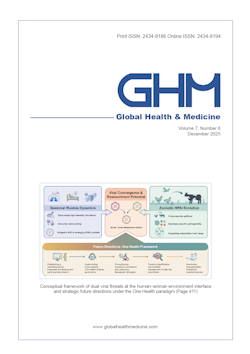Global Health & Medicine 2022;4(3):180-185.
Exploratory study on relative dose intensity and reasons for dose reduction of adjuvant CAPOX therapy in elderly patients with colorectal cancer
Tsuchiya A, Ogawa C, Kondo N, Kojima Y, Yamada Y, Terakado H
Capecitabine plus oxaliplatin, CAPOX, therapy is one of the standardized options for adjuvant chemotherapy for colorectal cancer, but the efficacy and the safety of CAPOX in elderly patients are unclear. In this study, we investigated the relative dose intensity (RDI) and reasons for dose reduction in patients over the age of 70 (elderly group) (n = 12) and those under the age of 70 (non-elderly group) (n = 24) receiving adjuvant CAPOX therapy for colorectal cancer. The median RDIs were 71.1% in the elderly group and 67.9% in the non-elderly group for oxaliplatin (p = 0.416), and 81.6% and 86.4% for capecitabine (p = 0.166), respectively. The rate of peripheral neuropathy which was the reason for dose reduction of oxaliplatin was approximately 4.5-fold higher in the nonelderly group than in the elderly group. In addition, hematologic toxicity was the most common reason for dose reduction at 50.0% in the elderly group. The results of this study suggested that a similar therapeutic intensity can be maintained in elderly patients relative to non-elderly patients by appropriate dose reduction and discontinuation of drug treatments. Elderly patients are more susceptible to hematologic toxicity than to peripheral neuropathy.
DOI: 10.35772/ghm.2021.01018







